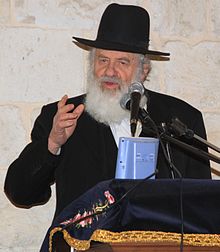Uri Zohar

Uri Zohar ( Hebrew אורי זוהר; * November 6, 1935 in Tel Aviv ) is a former Israeli film director and actor. In the 1970s he changed profession and lifestyle and became an Orthodox rabbi .
biography
After graduating from high school , Uri Zohar did his military service with Lahakat Nachal , Nachal's entertainment troupe , part of the Israeli army . After appearances as a stand-up comedian , he studied philosophy at the Hebrew University of Jerusalem in 1960 , became the leading Israeli film director in the early 1970s and was also considered an enfant terrible . After being sentenced to three months of community service for possession of marijuana , he was awarded the Israel Prize in 1976 , but did not accept it - the first case of such a refusal.
After meeting with the Berlin-born Rabbi Jizchak Shlomo Zilberman (1929-2001), he changed his lifestyle around 1977 and initially appeared on a television show with a kippah . From a representative of secular Judaism , he became a spokesman for the Charedic movement . In the 1992 Knesset election , he shot a television commercial for the Shas party.
On the occasion of a retrospective of the Cinémathèque française in October 2012, Zohar's contribution to Israeli filmmaking in the 1960s and 70s was recognized as a combination of elements of the Nouvelle Vague with Israeli reality.
family
Zohar's first marriage to singer Ilana Robina ended in divorce. He has seven children with his second wife, who appeared in his film Enayim gdolot ("Big Eyes"). Two of his sons are married to two daughters of his friend and professional colleague Arik Einstein .
See also
Web links
- Uri Zohar in the Internet Movie Database (English)
- Rabbi Uri Zohar holds eulogy for Arik Einstein (Engl.)
Individual evidence
| personal data | |
|---|---|
| SURNAME | Zohar, Uri |
| ALTERNATIVE NAMES | אורי זוהר (Hebrew) |
| BRIEF DESCRIPTION | Israeli former film director and actor |
| DATE OF BIRTH | November 6, 1935 |
| PLACE OF BIRTH | Tel Aviv |